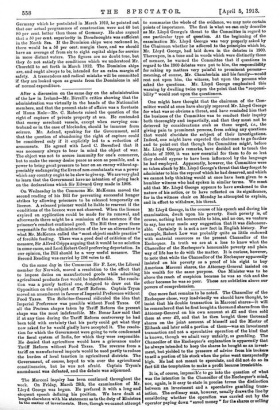One more fact remains to be noted. The Chancellor of
the Exchequer chose, very inadvisedly we should have thought, to insist that his double transaction in Marconi sharesâit will be remembered that he first bought a thousand shares from the Attorney-General on his own account at 22 and then sold them at over 23, and that he then bought three thousand shares on the joint account of himself and the Master of Elibank and later sold a portion of themâwas an investment; transaction and not a speculative operation of the kind that is known, though we admit very unfairly, as gambling. The Chancellor of the Exchequer's explanation is apparently that he always intended to keep the shares he bought as an invest- ment, but yielded to the pressure of advice from his broken, to sell a portion of his stock when the price went unexpectedly high. He had not meant to speculate, and did not do so in fact till the temptation to make a profit became irresistible.














































 Previous page
Previous page